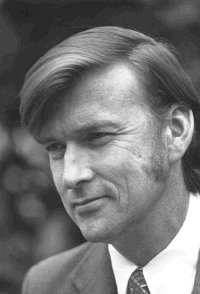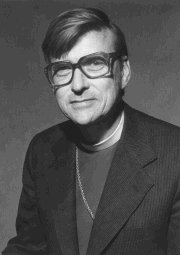Maverick Episcopal Leader, Bishop John Spong


The Papers of the Right Reverend John Shelby Spong, active author and retired Bishop of Newark, have been donated to The Archives of the Episcopal Church in a series of donations by the Bishop, beginning in 2000. Bishop Spong has been one of the most controversial figures in his own Church, a popular theologian who has reached wide audiences of Christians seeking new ways of understanding faith in a highly secularized society.
The collection, which spans the years 1955-2002, is a large and nearly complete archive, stretching back to his years at St. Paul's Church in Richmond (1969-1976), his involvement in public and community life, and his leadership in the Episcopal Church. While he has often been criticized for his forthright dissent from institutional norms and doctrinal rigidity, Bishop Spong has rallied the attention of young and old in his attempt to speak for a Church engaged in taking on the complexities of the modern world.
Spong is the most published member of the House of Bishops of the Episcopal Church. He is the author of eighteen books, including Why Christianity Must Change or Die; Here I Stand: My Struggle for a Christianity of Integrity, Love & Equality; Liberating the Gospels: Reading the Bible with Jewish Eyes; Resurrection: Myth or Reality?; Born of a Woman; Rescuing the Bible from Fundamentalism; Living in Sin?; and This Hebrew Lord. His published articles now number in excess of one hundred. He offers his readers a straight-forward prose and a willingness to probe on both the mysteries and the mystique of theology and doctrine. His voice on behalf of a liberal Church, while controversial to some traditionalists, never strayed from the purpose of searching for a unifying faith that is a fundamental characteristic of historical Anglicanism.
Spong's intellectual and moral perspective is rooted not only in his experience but in contact with progressive theology, particularly the Jesus Seminar, and from currents in evolutionary theory. His own thinking has been sharpened from encounters with those who have been marginalized from full participation in the community, and he has addressed those issues in terms of the institution he knows best - the Church. The papers document the young priest's emerging consciousness of a white Southerner in search of an adequate response to a history of racism and the Church's complicity in the denial of civil rights. While Bishop of Newark, Spong was the leading spokesperson for what he saw as the right to full recognition and privilege of Christian baptism for gays and lesbian members of the Church.
The Spong Papers consist of just over 50 cubic feet of manuscripts, correspondence, lectures, addresses, printed material, sermons, photographic materials, and scrapbooks. The collection has already received a first level processing to establish the arrangement pattern and to describe the papers with a preliminary inventory. The bulk of the archive captures the work and activities of Bishop Spong during the period of his Episcopate (1976-2000), including substantial documentation on his many public appearances, civic and ECUSA memberships, and active publishing career. An extensive series of sermons gives evidence of his evolving theological and social consciousness while serving as rector of St. Paul's Church in Richmond.
Bishop Spong's papers have been acquired in a series of separate accessions, and have already undergone a first-level arrangement and description, opening the collection to research access upon publication.
